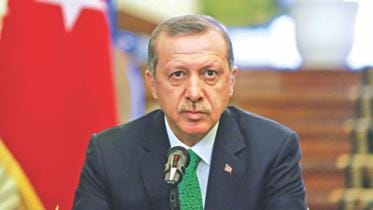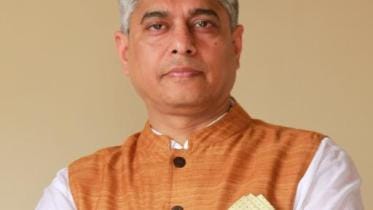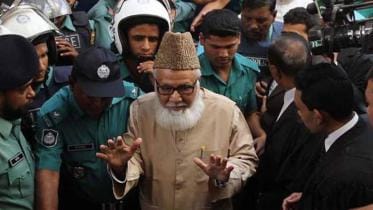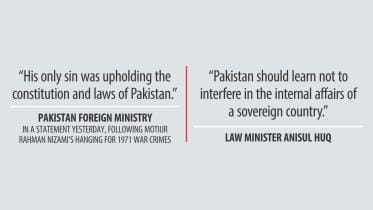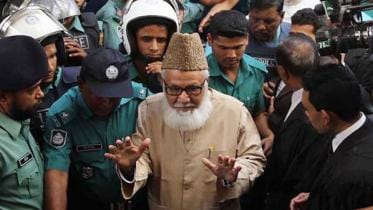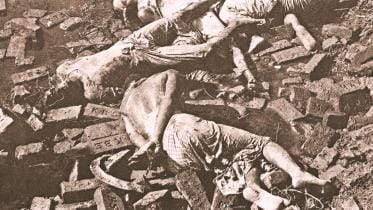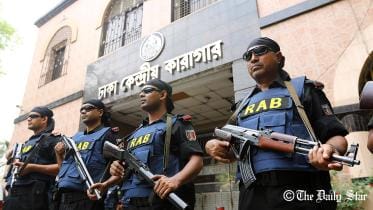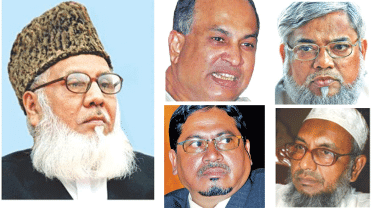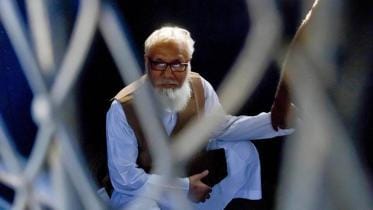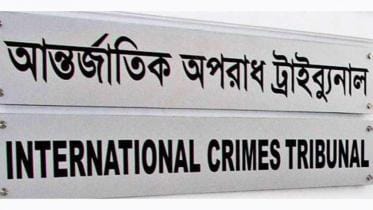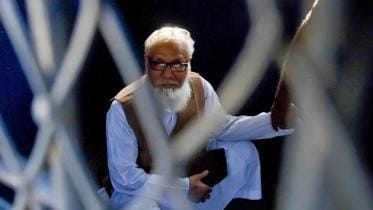death penalty of nizami
Bangladesh not worried at all
Bangladesh is not worried about the threat by Pakistan that it would move the UN to raise the issue of hanging war criminals as the
20 May 2016, 18:00 PM
Err-dogan!
Turkish President Recep Tayyip Erdogan did not like Europe's stance on the execution of Jamaat-e-Islami chief Motiur Rahman Nizami for committing crimes against humanity in 1971.
17 May 2016, 18:00 PM
India voices support for war crimes trials
India takes its stance in favour of war crimes trials in Bangladesh after the execution of a top war criminal Motiur Rahman Nizami, reports PTI.
13 May 2016, 11:59 AM
Pak amnesia intentional
Pakistan has come up with an outrageous claim that what Jamaat-e-Islami chief Motiur Rahman Nizami did in 1971 was to uphold the constitution of Pakistan.
12 May 2016, 18:00 PM
Turkey envoy asked to report home
Turkey yesterday asked its ambassador to Bangladesh to report home for consultations in the aftermath of the execution of Jamaat chief Motiur Rahman Nizami, the Turkish state-run Anatolia news agency said.
12 May 2016, 18:00 PM
Pakistan acts, Bangladesh counteracts
Diplomatic tensions between Bangladesh and Pakistan seem to be escalating, with each government summoning the other's
12 May 2016, 18:00 PM
Jamaat’s 24-hr hartal progressing peacefully
The 24-hour countrywide hartal enforced by Jamaat-e-Islami is progressing peacefully with very little hindrance to public life.
12 May 2016, 04:28 AM
Jamaat against legal process
Motiur Rahman Nizami enjoyed every opportunity to defend himself against the charges of war crimes and crimes against humanity.
11 May 2016, 18:00 PM
Pakistan again sides with war criminals
Pakistan national parliament has once again sided with war criminals by passing a resolution to express serious concerns over the execution of Jamaat-e-Islami chief Motiur Rahman Nizami.
This has caused a huge outcry in Bangladesh and risks further straining of the relations between the two countries. Ministers and war crimes trial campaigners have termed the resolution a brazen attempt to meddle in internal affairs of the country.
11 May 2016, 18:00 PM
Nizami's end
Nizami was the highest ranking Jamaat-e-Islami (JI) leader to be hanged for crimes against humanity in 1971. With his execution, the stigma that we had been carrying for the last 45 years has been removed.
11 May 2016, 18:00 PM
Nizami buried in Pabna
Executed Jamaat ameer Motiur Rahman Nizami is buried at his village home in Santhia upazila in Pabna. Relatives and a few locals attended his namaz-e-janaza held at a madrasa at Monmothpur before he was buried around 7:15am.
11 May 2016, 04:32 AM
END of NIZAMI
He had opposed the very notion of Bangladesh.From writing anti-liberation pieces in newspapers to instigating his fearsome gang called Al-Badr Bahini to kill unarmed civilians to directly participating in massacre...
10 May 2016, 18:00 PM
His 'peace' initiative was massacre plot
The villagers of Bausgari in Pabna's Santhia upazila were clueless about the grave dangers ahead.
10 May 2016, 18:00 PM
Lethal, last bite of losers
It was the final act of brutality against a nation yearning to be free.
The ruthless militia systematically rounded up one by one and tortured and brutally killed the nation's brightest minds.
What it wanted was to execute the evil plot of Pakistan occupation forces to wipe out the Bangalee intelligentsia towards the end of the Liberation War in 1971.
10 May 2016, 18:00 PM
LIVE: NIZAMI'S EXECUTION TIMELINE
Find the latest update from Dhaka Central Jail centreing the execution of death row war criminal Motiur Rahman Nizami.
10 May 2016, 15:00 PM
How Pakistan reacted over war criminals’ punishment
Every time an execution of a war criminal took place in Bangladesh, the Pakistan government came up with “questionable comments” on the issue, which is Bangladesh’s internal matter.
9 May 2016, 15:07 PM
Family meets death row war criminal Nizami in jail
Family members met condemned war criminal Motiur Rahman Nizami in Kashimpur jail in Gazipur yesterday.
6 May 2016, 18:00 PM
The tale of long delay in his trial
The investigation into the war crimes of Jamaat-e-Islami leaders Motiur Rahman Nizami and Abdul Quader Mollah began on the same day in July 2010. Charges were framed against the duo on the same day in May of 2012.
5 May 2016, 18:00 PM
NO to Jamaat war criminal NIZAMI'S plea
The legal battle in the war crimes case against Motiur Rahman Nizami has finally drawn to a close after 69 long months.
The man, who led the ruthless militia Al-Badr in the massacre of Bangalees including intellectuals and professionals during the 1971 Liberation War, has now only one option left -- seeking presidential clemency by confessing to the crimes he committed during the nine-month war.
5 May 2016, 18:00 PM
SC verdict on Nizami's review plea today
All eyes are on the Supreme Court as it is set today to pass an order on the petition of war criminal Motiur Rahman Nizami,
4 May 2016, 18:00 PM




